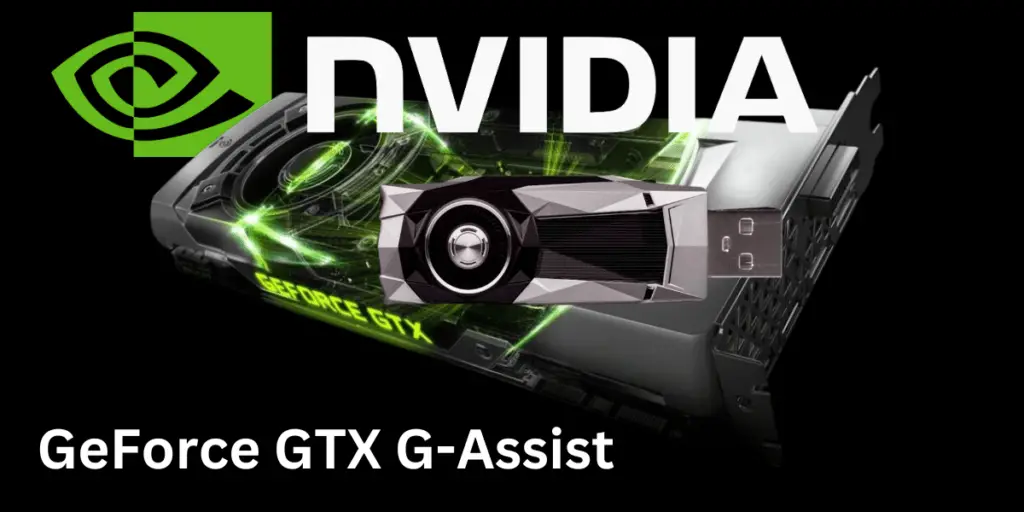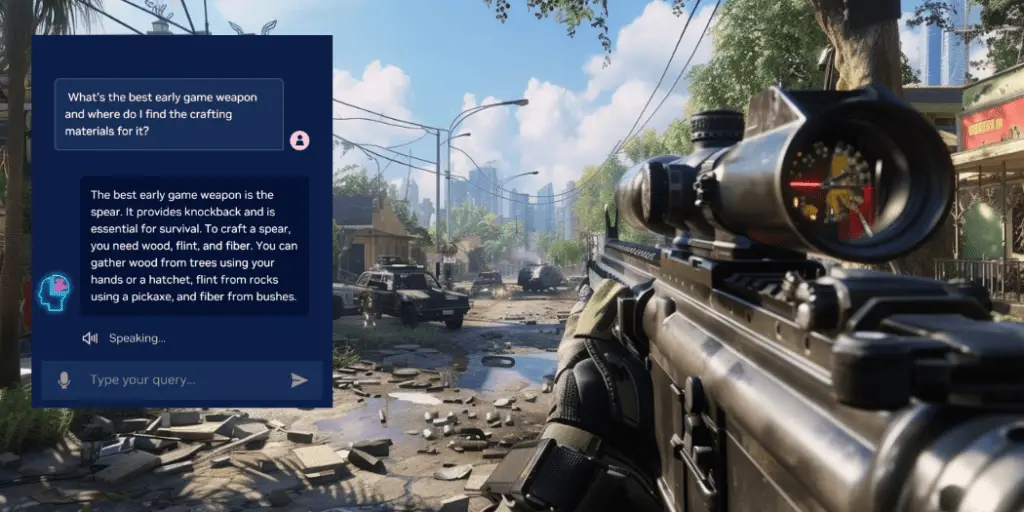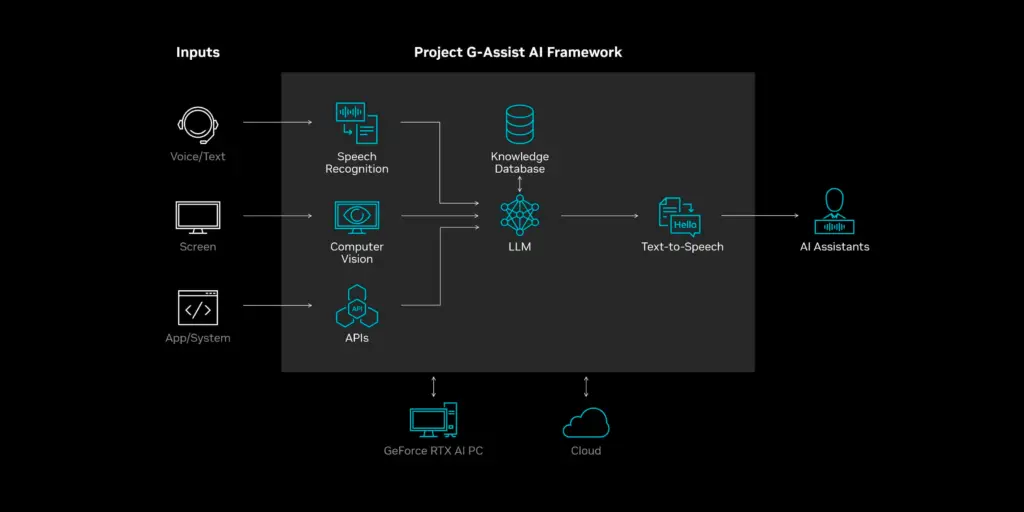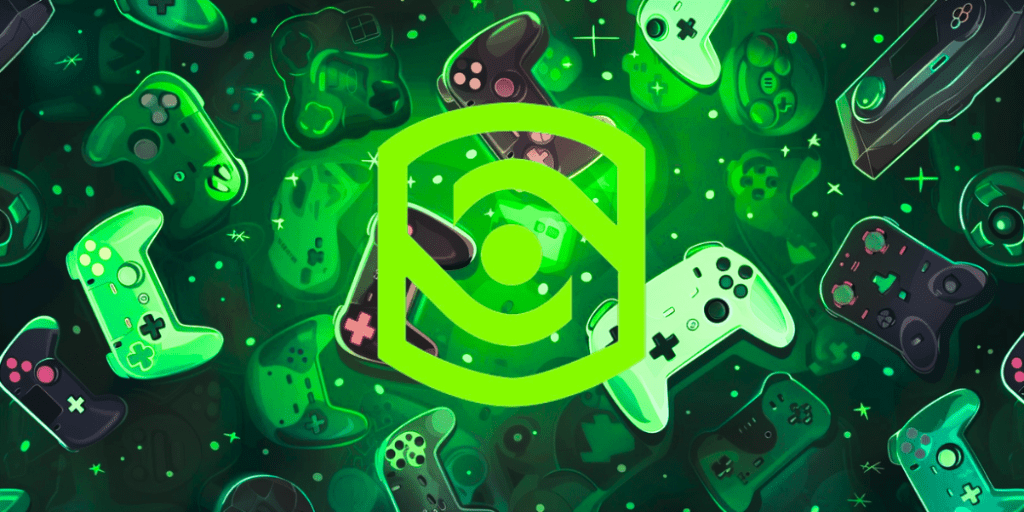At Computex 2024, one of the world’s premier technology trade shows, Nvidia released its latest groundbreaking Project G-Assist This RTX-powered gaming AI assistant promises to revolutionize the gaming experience by providing real-time, intelligent support to players.
Demonstrated using the popular game ARK: Survival Ascended, Project G-Assist showcases Nvidia’s commitment to enhancing gameplay through advanced AI capabilities.
Project G-Assist
Leveraging Nvidia’s Ray Tracing Texel eXtreme platform, Project G-Assist integrates advanced artificial intelligence to offer real-time assistance in various gaming scenarios.
Project G-Assist is equipped with both natural language processing and computer vision capabilities, allowing it to understand and respond to player queries through text, speech, and on-screen information.

During the tech demo, Nvidia showcased its capabilities using ARK: Survival Ascended, highlighting how the AI can assist players by offering gaming strategies, analyzing multiplayer replays, and optimizing game settings.
This AI assistant represents Nvidia’s effort to bring comprehensive game knowledge directly to players, utilizing generative AI to provide context-aware responses and solutions. Although still in the demo phase with no confirmed launch date.
Features
Project G-Assist can understand and respond to player queries through text and speech using Natural Language Processing, making it highly interactive and user-friendly.
The AI assistant also uses computer vision to analyze on-screen information in real-time, providing context-aware responses and solutions based on the current game state.
Players can receive tailored strategies to overcome challenges, find the best weapons, and optimize their gameplay from the early stages of a game.
Project G-Assist can review multiplayer replays, offering insights and recommendations to improve player performance and strategy.
The AI assistant can help configure gaming systems for optimal performance by adjusting settings to match the player’s hardware capabilities. It provides detailed insights into performance metrics, helping players understand how their system is performing and where improvements can be made.
Project G-Assist also intelligently manages power consumption, balancing performance and efficiency to ensure the best gaming experience.
Project G-Assist can run both locally on Nvidia GeForce RTX GPUs and from servers, offering flexibility in how players access its features. The AI can access the internet to gather information and provide accurate answers to player queries, ensuring it stays up-to-date with the latest game data and strategies.
By continuously analyzing the game screen, Project G-Assist can pick up contextual clues and provide relevant, timely assistance.
The AI delivers personalized responses based on the player’s current game session, making the help provided more relevant and effective.
Technical Specifications
Project G-Assist utilizes advanced Natural Language Processing models to understand and respond to player queries through text and speech, making interactions intuitive and seamless.
It is equipped with computer vision capabilities to analyze on-screen content in real time, enabling the AI to provide context-aware assistance based on the game’s visuals.
Powered by Nvidia’s Ray Tracing Texel eXtreme platform, Project G-Assist enhances the AI’s ability to process and render high-quality graphics and real-time ray tracing, providing a visually immersive gaming experience.
It is designed to run efficiently on Nvidia’s GeForce RTX GPUs, ensuring that the AI assistant can leverage the full power of these advanced graphics processors.
Project G-Assist can operate locally on a PC, utilizing the power of GeForce RTX GPUs to deliver low-latency, high-performance assistance.
It is also capable of running from remote servers, providing flexibility in deployment and ensuring that players with varying hardware capabilities can benefit from its features.

It can access the internet to fetch real-time information and updates, ensuring the AI assistant stays current with the latest game data and strategies.
The AI incorporates large language models that allow it to generate coherent and contextually relevant responses based on the player’s queries and in-game context.
It uses advanced vision models to enhance contextual awareness by analyzing the game screen, which helps the AI understand and respond to complex in-game scenarios.
Project G-Assist provides recommendations for optimizing game settings based on the player’s hardware configuration, ensuring the best possible performance.
It offers detailed insights into system performance, helping players identify and address any issues that may be affecting their gaming experience.
It also features intelligent power management to balance performance and energy efficiency, adapting to the player’s needs and system capabilities.
The AI assistant helps players develop game strategies, such as the best ways to survive early game phases, tackle difficult missions, and optimize gameplay.
It analyzes multiplayer replays to provide feedback and recommendations for improving player performance and strategy.
It helps find the best settings for playing a game on a given PC, including graphics optimization and system tweaks for improved performance.
Built with a modular architecture that allows for future updates and expansions, Project G-Assist ensures that the AI assistant can evolve with new technologies and gaming trends.
As part of Nvidia’s RTX AI Toolkit, it includes tools and SDKs for developers to customize, optimize, and deploy AI models on RTX-powered systems, fostering a community of innovation and continuous improvement.
Nvidia RTX AI Toolkit
Developers can start with pre-trained models and tailor them to specific applications using open-source tools like QLoRa. This allows for fine-tuning AI models to meet unique requirements and improve performance.
The Nvidia TensorRT Model Optimizer helps in quantizing models to use up to 3x less RAM, making them more efficient and faster without compromising accuracy.
The AI Inference Manager SDK simplifies the deployment process by preconfiguring PCs with necessary AI models, engines, and dependencies.
It orchestrates AI inference seamlessly across local PCs and cloud environments, ensuring efficient and scalable AI deployments.
Nvidia TensorRT Cloud provides cloud-based optimization to enhance the performance of AI models, ensuring they run efficiently on RTX hardware.
By leveraging the full power of Nvidia RTX GPUs, models optimized with the RTX AI Toolkit can deliver up to 4x faster performance compared to their original pretrained versions. This significant boost ensures real-time responsiveness in AI applications.
The optimization process also reduces the memory footprint of AI models by up to 3x, making them more efficient and easier to deploy on various hardware configurations.
The RTX AI Toolkit is integrated with widely used applications in the creative and development sectors, such as Adobe Photoshop, Blackmagic Design’s DaVinci Resolve, and Topaz Labs’ tools. This integration accelerates AI-powered capabilities, enhancing the functionality of these applications.
Popular generative AI frameworks and applications, including Automatic1111, ComfyUI, Jan.AI, LangChain, LlamaIndex, Oobabooga, and Sanctum.AI, leverage components of the RTX AI Toolkit to boost performance and efficiency.
The RTX Remix Platform allows developers to remaster classic games with full ray tracing, DLSS 3.5, and physically accurate materials. It includes both the RTX Remix Runtime renderer and the RTX Remix Toolkit app, providing powerful tools for game asset modification and enhancement.
Nvidia has made components of the RTX Remix Toolkit open source, enabling modders to expand game compatibility and enhance rendering capabilities. This fosters a collaborative environment for continuous improvement and innovation.
The RTX Video SDK is available to all developers. It supports AI-powered features such as super-resolution, sharpening, compression artifact reduction, and HDR conversion. It enhances video editing and playback applications, enabling high-quality video processing.
Implications for Gaming and AI
Project G-Assist’s ability to offer context-aware, real-time help means players can enjoy a more tailored and dynamic gaming experience.
This includes personalized strategy recommendations, optimal performance settings, and real-time problem-solving, which can reduce frustration and enhance enjoyment.
AI assistants can also make gaming more accessible to a wider audience, including those with disabilities or those new to gaming, by offering customized help and adaptive gameplay suggestions.
The integration of AI into gaming can lead to more dynamic and responsive game environments, with AI generating unique scenarios, quests, and challenges tailored to the player’s style and preferences. This results in a more immersive and personalized experience.
AI-driven non-player characters can exhibit more realistic behaviors and interactions, improving the depth and realism of game worlds and leading to richer storytelling and more engaging gameplay.
In competitive gaming and esports, AI assistants can analyze player performance and offer detailed feedback, helping gamers improve their skills more efficiently.
This is particularly beneficial in competitive gaming and esports, where marginal gains can make a significant difference.
AI can also help monitor and identify unfair practices in online gaming by analyzing gameplay patterns to detect and mitigate cheating, ensuring a fairer competitive environment.
AI-enhanced modding, through tools like the RTX Remix Toolkit, allows modders to remaster classic games with advanced graphics and AI enhancements.
This breathes new life into older titles and expands creative possibilities for the gaming community. AI tools integrated into popular creative applications enable game developers and content creators to streamline their workflows, enhance productivity, and produce higher-quality content faster.

The technologies developed for Project G-Assist and the RTX AI Toolkit have potential applications beyond gaming. AI-driven assistance can be applied in fields such as education, training simulations, virtual reality, and more.
As AI becomes more integrated into PCs, everyday tasks such as content creation, productivity, and entertainment can benefit from enhanced AI capabilities, making computing more efficient and enjoyable.
The use of AI in gaming and other applications raises important questions about data privacy and security. Developers and companies must implement robust safeguards to protect user data.
As AI technologies become more pervasive, there will be a growing need for frameworks and regulations to ensure ethical use, address biases in AI models, ensure transparency in AI decision-making, and protect user rights.
The modular and open-source nature of Nvidia’s AI tools ensures that the technology will continue to evolve. This fosters a collaborative environment where developers and the community can contribute to and benefit from ongoing advancements.
Future Developments
Nvidia is likely to continue refining the AI, incorporating feedback from demonstrations and collaborating with game developers to enhance its functionality and performance.
The future developments in Project G-Assist may include expanding its compatibility with a broader range of games, improving the AI’s contextual understanding and response accuracy, and integrating additional features that cater to both casual and competitive gamers.
Nvidia’s continuous advancements in AI and GPU technology will play a crucial role in shaping the final product.
The RTX AI Toolkit, which supports the development and optimization of AI models on RTX-powered systems, is already available to developers.
This toolkit enables developers to customize and deploy AI models efficiently, paving the way for a new generation of AI-powered applications and gaming experiences. As more developers adopt and utilize the RTX AI Toolkit, we can expect a surge in innovative AI-driven solutions across various domains.
Project G-Assist and further advancements in the RTX AI Toolkit, it is clear that Nvidia continues to be in charge of bringing cutting-edge AI innovations to the forefront of technology.


